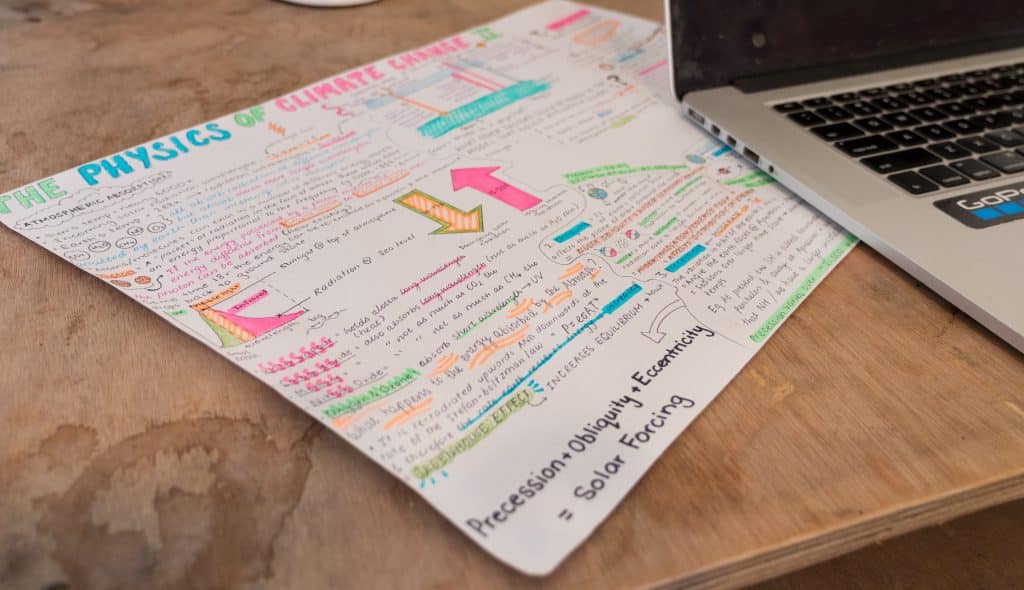
An Inspiration Education Extended Guide
We get it. Exams can be tricky.
We know what it feels like to feel prepared for an exam, then have that illusion shattered the minute we open the first page of the exam paper. We’ve all been there.
Maybe your goal is to just make it through an exam without panicking. Maybe you’re just aiming to pass. Maybe you’re going for top grades and just missing out.
Whatever your goals, whatever your struggles with studying and exams, there is some very good news.
The way that schools get you to think about learning, particularly exams, is all wrong. Your whole life you have been fed a subtle, seductive yet sabotaging lie.
The lie is this:
If you cannot learn something, or if you get a bad grade in your exam, it is mainly due to your own level of intelligence.
This idea is completely wrong and becomes a self-fulfilling prophecy for many intelligent students who are absolutely capable of success.
When we don’t get a concept or when we do badly in an exam, we have been taught to think it was our brain that’s the issue, rather than it being an issue of strategy.
Like getting fit and losing weight, learning and exams are just skills that you have to master. When training to get fit, it isn’t who you are (or our lack of natural talent) that’s holding you back. Instead, it’s what you are doing (or our lack of strategy) that is holding you back.
The aim of this book is to give you the strategies we wish we had when we were learning concepts and sitting exams.
Some of the strategies you may be doing already; that’s awesome – spend more time doing these and this guide should help you refine these. Some of the strategies you may have never even thought about before, let alone tried. These may need a bit of practice to get the hang of.
That’s OK too, and a normal part of learning new strategies.
These tried and tested strategies have been compiled by our team of coaches across New Zealand and will help you not only lift your grades, but develop skills that will give you the confidence to learn throughout your entire life.
So, if you’re ready — let’s get into the strategies to help you ace exams!
Figure out what you know and what you need to know.
Studying involves a lot of self-discipline.
When studying, it’s easy to resort to covering the concepts that you already have the hang of. We understand why. Studying what you already know is less challenging, your brain has to work less. However, you still feel like you’re studying so the guilt that comes with procrastination doesn’t sink in.
Despite how appealing the above scenario may be, studying is meant to be hard. If you’re not challenged while studying, you’re probably not learning.
It’s so tempting to push all of the tricky concepts that you don’t understand to the bottom of your to-do list. Everything we don’t know makes us feel a bit useless, and so it’s easy to just ignore it and focus on the good stuff instead.
However, the most effective learners are those who evaluate the concepts that they find the most difficult and spend time overcoming their weaknesses before practicing their strengths.
So, study what you need to know, not what you already know. It seems simple enough, right?
The hardest part of this step is actually deciphering what you know and what you don’t. One of the biggest issues that students face with their learning is that they struggle with self-monitoring their own knowledge.
To differentiate between what concepts you already know, and what concepts you still need to learn, follow these steps :
- Download a checklist from the NCEA website that covers the points you need to know for the subject you’re studying (checklists can also be found from StudyTime, NoBrainTooSmall or from your teacher).
- For each point on the checklist, test yourself by writing a brief overview of the concept or answering a few quiz-style questions about the topic.
- Rate your knowledge of each concept on the checklist on a scale of 1-5: 1 not knowing anything and 5 being super confident.
- Complete the subject audit form here and include your concept ratings.
- When studying, spend most of your time focusing on the concepts that you rated the lowest so you have a well-rounded knowledge of all the concepts you need to know.
Work in sprints.
Think of studying for exams like training for a marathon.

On your first day of training, you wouldn’t go out and run 42kms. You would burn-out quickly due to a lack of prior training, and you would probably be put off running for a long time. The better route to success would be to slowly work up to running the 42kms by running a bit further every day.
This simple idea of training in short bursts has been proven effective in all areas of human performance. You don’t have to be a marathon runner to use this strategy!
When studying, students should start out small by studying in short, focused ‘sprints’ followed by brief breaks. Start small by studying in 15 minute bursts followed by one 10 minute break. Over time, slowly increase the length of time you’re studying (and breaking) for. This strategy is effective because studying for short bursts promotes more intense focus, and will give your brain the time to process and consolidate information. It also makes studying seem less daunting, as students work up to studying for longer periods of time.
Follow these steps to become an expert studier (or marathon runner!) in no time:
- Set a timer for 15 minutes.
- Put in some solid study until the timer goes off, making sure you’re spending every minute working with no distractions.
- Have a ten-minute break to check your phone, walk around, stretch, get outside etc.
- Rinse and repeat.
- Increase the amount of time you’re studying for as you begin to feel more comfortable studying for extended lengths of time.
Link concepts together for better understanding.
What if we told you that the key to remembering tricky concepts, is as simple as relating these concepts to your real life experiences?
Linking is an effective study strategy that helps students remember key concepts by creating links between the concept and the student’s life.
Why is this strategy effective? Well, it’s easier to add a connection to an existing pathway in the brain (an experience in your own life) than to create a whole new pathway.
So, what are the best ways to practice linking when studying?
There are multiple ways of ‘linking’ information:
- Think about how the concepts you’re learning relates to previous information you’ve already learnt. For example, when learning about DNA, you could think about where you’ve heard the word DNA before – on the news, on YouTube or TV, or maybe in a video game.
- Think about how the concept you’re learning relates to your own life. For example, when learning about Alleles you might think about how you have blue eyes, while your sister has blue or brown eyes.
- Create metaphors or analogies for certain processes or concepts. For example, you could think of DNA as carrying instructions through the order of bases like a book carries words through the order of letters.
Remember, linking difficult concepts to a personal or familiar idea will create stronger pathways in your brain and make those tricky concepts much easier to remember and understand during exams.
Avoid ‘illusions of learning’ by practicing retrieval.
Illusions of learning – one of the biggest thieves of student’s success in exam time.
If you’ve read any of our previous blog posts, you’ve probably heard us harp on about illusions of learning and how to avoid them.
But we won’t stop preaching the importance of avoiding illusions of learning, because the success of so many students continues to be undermined by this.
So, what is an ‘illusion of learning’, and how can we avoid them?
Simply put, an illusion of learning is when you think you’ve learnt something, but really you haven’t. An illusion of learning is that feeling you get in a middle of an exam when the answer is on the tip of your tongue, but you just can’t recall it.
Common study techniques like highlighting, rereading your notes, and copying out your notes, again and again, are massive contributors to illusions of learning. These strategies may help you recognize words, or diagrams, or concepts. However, in an exam, just being able to recognize a concept won’t be efficient. You will also need to be able to recall concepts, and also understand them.

The main way an illusion of learning can happen is when students mistake recognition for recall, or recall for true understanding. Being able to “remember” something once it’s shown to you, is recognition; being able to”remember” something without any cues presented is recall; and being able to remember without any cues and being able to explain it coherently is understanding.
So, now that we’ve told enough illusions of learning horror stories, we’ll address how you should avoid falling into the trap.
The key to avoiding illusions of learning is retrieval practice and self-explanation.
There’s a misconception about learning that places a lot of importance on getting information ‘into’ your brain (learning something), but not enough importance on getting information ‘out of’ your brain (remembering something).
This is why retrieval practice, or testing yourself, is such an effective strategy. Testing yourself strengthens pathways in your brain to the information you’re trying to remember, and therefore makes it easier to access. Say goodbye to those stressful ‘tip of the tongue’ moments in the middle of exams!
Try these retrieval strategies to avoid illusions of learning:
- Teach the information to a friend without your notes open.
- Cover up a page in your textbook after reading it and see if you can explain it to yourself.
- Practice the material like you are tutoring a friend.
- Get a blank paper and write down everything you know without your notes.
- Check your notes and see what concepts might not have fully stuck.
- Rinse and repeat.
- Practice past exam papers.
Do past exam papers in exam conditions and reflect on past exams.
Exams are high-pressure situations.
Students often want to avoid putting themselves under such stress until it comes to exam time. However, it’s so important that students practice sitting past exams in exam conditions to get used to the pressure of exams. Your memory and brain adjusts based on the environment you’re in. If you put yourself in an environment where you’re under pressure, your brain will learn to adjust and cope with the extra stress, meaning you’ll manage stress better during exam time.
Just like the All Blacks practice in high-intensity situations, when studying you should also practice like you play.
Follow these steps for effective exam preparation:
- Download a practice exam from the NCEA website (or the StudyTime website here)
- Find a quiet place at home and get a family member or friend to be the “examiner”.
- Turn off your phone and put your notes away.
- Do the exam timed.
- Mark your answers using the marking schedule and reflect on the mistakes you made.
- For each answer write the model solution and make note of what you still need to work on.
As well as sitting practice exams in exam conditions, students should reflect on their exam results from previous years. Understanding what went wrong (and what went right) for you in your previous exams, is vital to making improvements this time round!
Have a look over your past exam papers and ask yourself the following:
- What went wrong with my answers?
-
- Did I write the answers in the way that the examiners wanted?
- Did I understand the concepts in enough depth?
- Did I manage my time well on the day?
- What went wrong with my exam preparation?
- Did I do enough past exams?
- Did I have a plan of how to study?
- Did I study in the most effective way?
- Did I continuously self-assess my own knowledge as I was studying?
- Where was I successful and why?
Plan out your exam answers.
Ask yourself: ‘what do I need to get good grades in my exams?’
The first thought that came to your mind was probably that walking into an exam with a sound knowledge of the subject content, will be enough to guarantee you good grades.
This is a major misconception that many students hold about exams. Content knowledge isn’t the only guarantee of success in exams. Knowing how to structure your answers is also vital to exam strategy.
Remember: content isn’t everything!
Create a plan outlining how you will structure your exam answers. NZQA markers aren’t just on the lookout for accurate subject knowledge, they also give points for well structured, clear, and easy to read answers.
The following strategies will help you ace those long and difficult written answer questions.
The keyword prompt method helps students get familiar with common keywords in exam questions, so these keywords prompt students to respond in a certain way when it comes to exam time. This strategy is useful because students are often thrown off by the ‘complexity’ of exam questions. However, the wording of these questions can often make them seem a lot more nasty than they really are.
So, what can we do?
A good strategy is to go through all of the past exams for the subject you’re studying, then create a glossary of key phrases that the exam questions use, and then a translation of the phrase in your own words. Make these into a list of flashcards, and test yourself.

Outlining is another strategy that students should use to structure their exam answers.
Before answering each exam question, students should outline the bullet points that they will cover in their answer on a spare sheet of paper. Outlining is effective because it will ensure you answer the entirety of the question, it helps break the writing task down into chunks and, it gives a big picture overview of what you have to write.
If we were attempting to answer a Level Three Biology question about the courtship rituals of Peacocks, then we could produce the following outline:
- Peacocks select their mate by shaking their feathers
- This is called courtship
- Define courtship
- Explain why it is important
- Talk about what characteristics Peacocks look for during their courtship ritual
- Discuss why the Peacock has this particular ritual.
The IDEA model is another effective strategy for tackling those tricky long answer questions.
Students often find long answer written questions daunting, especially when they’re under the time pressure of an exam. The IDEA model is a simple acronym that will help you structure your answers by breaking down your response into four parts.
The letters in IDEA each stand for a step in your answer that you should follow to make sure you cover all the areas that the question is likely to be assessing:
Identify the main concept
Define the concept
Explain the concept in relation to the question
Analyse what the question is asking you by linking ideas together
The IDEA model will help you craft a critical and thorough response, that is likely to impress the marker.
Create an exam strategy.

Just like professional athletes create a ‘game plan’ for game day, students should create an exam strategy for their own game day (exam time)!
Athletes have a routine before they start a sports match to get them motivated and get their mindset ‘in the game’. You should do the same before exams. Think of a routine that you can do before exams to get into the zone. The specifics of this routine are irrelevant – it could be anything from listening to a specific song, or going through your flashcards one last time. What is relevant is that you have a set routine to go through before each exam to get your mindset into zone of sitting exams.
If, then planning is another great strategy to reduce stresses and get you into the ‘exam zone’.
Exams are designed to put the pressure on students. For this reason, students shouldn’t expect their exams to go exactly to plan. In fact, they should prepare for things to go wrong.
Follow these steps to create a plan of attack that will help you keep calm and focused in the face of pressure:
- Write down on a piece of paper: “If [event] happens, then I will do [action]”.
- Keep writing down these statements until you’ve written down all of the things that could go wrong.
- Review these statements before each exam.
Exams are made to throw you off. Make a plan of attack that will help you prepare for things going wrong. This will help you keep calm if your exam throws an unexpected question at you!
Write away your worries.
Have you ever walked into an exam and just “blanked” when you opened the first page, or felt so nervous that your hands started shaking when trying to open your exam booklet?
If you’ve experienced these intense nerves during exam period, you’re not alone. Exam anxiety is not uncommon for students. These anxious feelings that students experience around exam time are a bit contributor to why students often don’t do as well as they’d like in examinations.
So, what can you do to avoid this anxiety?
It has been scientifically proven, that when placed in high-pressure situations, people perform better when they simply write down all of their worries before going into the situation.
Students should practice this strategy, of writing down their worries, before their exams to reduce their anxieties. The night before an exam, write down one negative phrase that you usually think before an exam and write down one positive self-talk/rational statement to counteract this.
For example, your negative phrase could be: “I can’t do this exam, I’m going to fail”, and your positive statement to challenge this negativity could be: “I studied, I’m prepared, I’ll do the best I can.”
This strategy works because; constant negative self-talk can strongly influence our emotions and behaviours. Predominantly negative thoughts will stimulate self-defeating emotions, setting up a negative cycle in all aspects of our lives – including exams.
Writing out your worries just before an exam will help you to recognise your negative self-talk and ditch this negativity before your exam. Introduce positive self-talk disrupt the cycle so you can walk into your exam with a positive attitude and lots of confidence!
Create an exam ‘cheat sheet’.
Before we dive into this next tip, a quick disclaimer: this is not encouragement to cheat on your exams!
However, before you sit your exams, you should create a cheat sheet.
A cheat sheet is a one or two-page summary sheet of all of the essential information that you need to know for a subject. For English, note down some quotes on your cheat sheet. For Maths, note down some of the equations you need to remember. Anything you think is essential – put it on the summary sheet.
After you’ve created your cheat sheet follow the below steps to ensure success in your exams:
- On the evening before your exam read through your cheat sheet once.
- Cover up your cheat sheet then see if you can write it out again from memory.
- Repeat this process until you’re able to rewrite the cheat sheet flawlessly, without looking at the original sheet.
When exam time comes, you should spend the first 10 minutes of every exam trying to reproduce your cheat sheet on a spare piece of paper. You can then refer to this information on the sheet for the entire exam so you don’t have to spend valuable remembering key information.
Remember that exams are important, but not too important.

This last point might seem contradictory, considering that we’ve spent this entire guide preaching the importance of exams. And while we don’t want this to take away from our previous points, remember: exams aren’t everything.
In the lead up to exams, make use of the strategies we’ve outlined above. Don’t lose sight of the importance of effective study and exams in general. However, don’t overwork yourself. It’s easy to get caught up in the pressures of exams and consequently burnout before it comes to exam time.
We’ve had a lot of experience with students who are motivated studiers. They go into study leave with the drive and passion to ace their exams. This is great! However, these students, who exert all of their energy into their studies all of the time, often burnout before their exams.These are also the students who will be the harshest on themselves if they do underperform on their exams which is not a proactive way to make improvements. While studying, make sure you take regular breaks, keep up your exercise, and get a substantial amount of sleep to avoid burnout.
Exam success should never come at the expense of a student’s emotional or mental well being, and while it’s important to take exams seriously, it is far more important to foster a healthy relationship towards learning.
Take our above advice, but pace yourself and make sure you don’t get too caught up in the stresses of exam period.
Best of luck for your exams!
